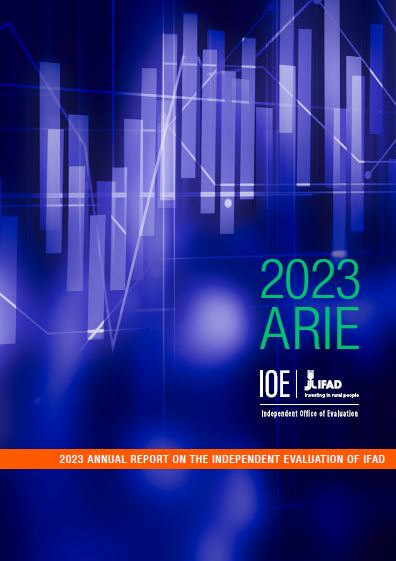IFAD projects continue 10-year positive performance in climate change adaptation, while downward trends in effectiveness and impact require closer review - IOE
Rome, 11 December 2023 – Performance of IFAD projects in environment and natural resource management and climate change adaptation (ENRM and CCA) has continued to improve over the past 10 years. This is one of them main findings of the 2023 Annual Report on the Independent Evaluation of IFAD (ARIE), published by the Independent Office of Evaluation of IFAD (IOE).
Performance in ENRM and CCA provides the only clear instance of continued improvement during the past 10 years. The share of well-performing projects in this area improved from 71 per cent during 2011-2013, to 90 per cent during 2019-2021. This performance could be attributed to the sustained efforts by IFAD for over a decade, making responsiveness to climate change its corporate priority, committing financial and human resources to strengthen the integration of climate and environmental considerations in all its interventions, and providing necessary guidance.
For instance, IFAD declared environment and climate change adaptation as a corporate priority in 2010; committed an increasing share of its programme of loans and grants to finance climate interventions; launched the Adaptation for Smallholder Agricultural Programme in 2012 to learn lessons and help mainstream climate change adaptation across all IFAD’s operations and country strategic opportunities programmes; mandated the Social, Environment, and Climate Assessment Procedures in all projects since 2015; instituted a dedicated unit with capacities to support mainstreaming themes including climate change and environment in 2018; developed the new IFAD Strategy and Action Plan on Environment and Climate Change (2019-2025) and continued to develop mechanisms and tools to guide climate responses, such as the Adaptation Framework (2020).
The ARIE finds that relevance (93 per cent) and innovation (87 per cent) are the other two criteria that have the largest shares of projects performing well, out of the 71 evaluated between 2019 and 2021.
From a geographical perspective, the 10-year average of project performance ratings shows that Asia and the Pacific has the largest share of projects performing well, while West and Central Africa has the smallest share in all criteria. In this regard, it must be noted that factors beyond the control of any IFAD country presence – for instance, the political, institutional and development context in which projects operate and the implementation capacity and ownership of projects by government counterparts – heavily influence project performance.
The ARIE 2023 also presents downward trends, which may warrant further analysis. The most notable refers to the rural poverty impact and effectiveness criteria, which were not rated as ‘highly satisfactory’ across any of the 288 projects completed during 2012-2021. Moreover, effectiveness and rural poverty impact performance have declined since 2018. The share of effective projects fell from 83 per cent during 2017-2019, to 75 per cent during 2019-2021. For rural poverty impact, the share of well-performing projects fell from 89 per cent during 2012-2014 to 79 per cent during 2015-2017, plateaued and again fell, beginning in 2017-2019, ending at 72 per cent during 2019-2021.
This decline in effectiveness performance was more noticeable under conditions of fragility and conflict, where the share of well-performing projects fell from 67 per cent to 42 per cent during this period. In this regard, projects in non-fragile contexts unambiguously outperformed those in fragile contexts in effectiveness, efficiency and sustainability of benefits. This analysis compared the performance of the 73 projects that operated under conditions of fragility and the 215 completed projects during the period that did not.
Based on these analyses, the report notes that IFAD has under-invested in country programme delivery at a time when project sizes and complexity were increasing. Though IFAD has taken steps to reverse this decline, the report highlights the need for IFAD to track the longer-term impact of underinvestment practices in country programme delivery.
The assessment of how fit-for-purpose IFAD Country Offices were to deliver on their mandate following the accelerated decentralization efforts and reassignment exercises undertaken since 2017 needs closer scrutiny.
For further information, please contact Dr Alexander Voccia [here]
RESOURCES
- To access 2023 Annual Report on the Independent Evaluation of IFAD, please click here.
IOE 20th ANNIVERSARY
- To access the brochure ‘More than a journey | 20 years of independence, please click here.
- To access Fabrizio Felloni’s interview on the evolution of independence of IOE, please click here.
- To learn why independent evaluation makes IFAD a more credible institution, please click here.
CONTACTS
